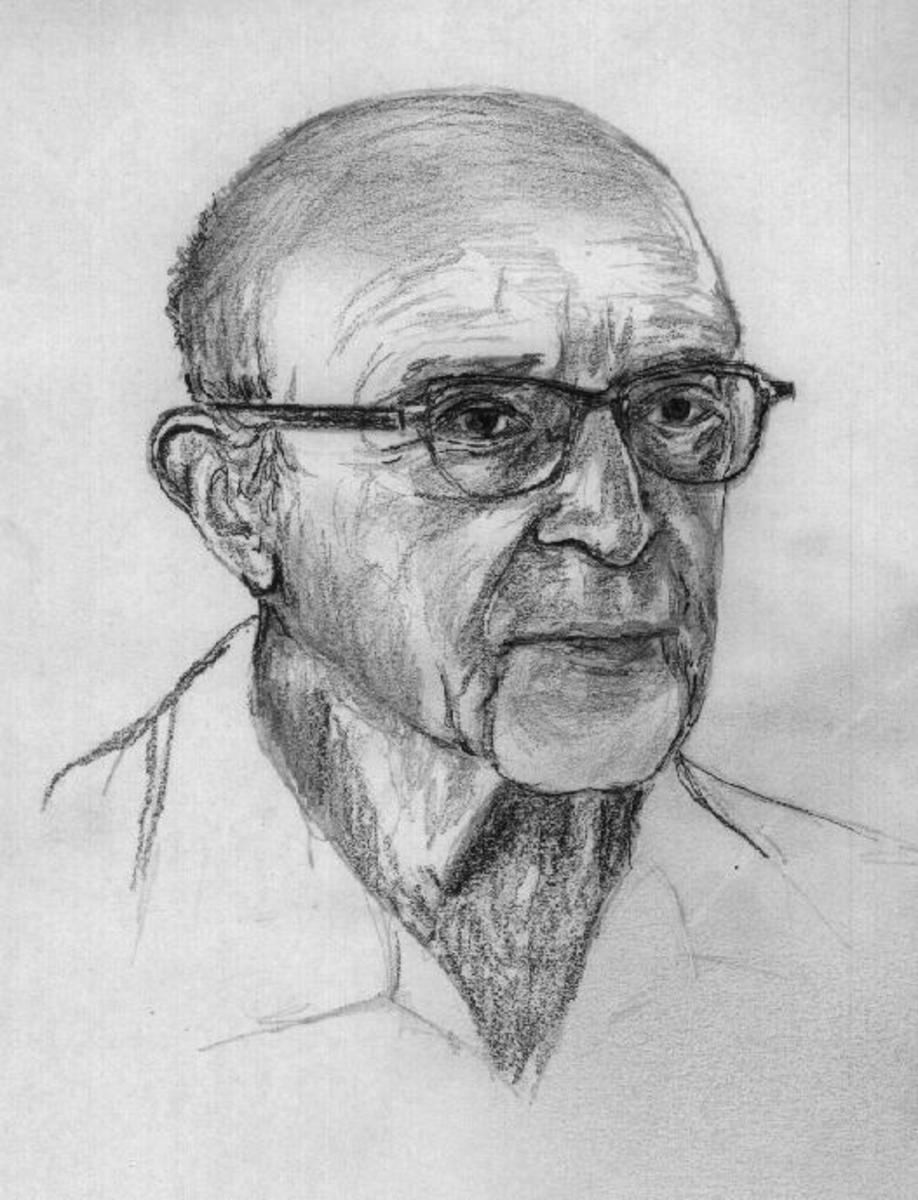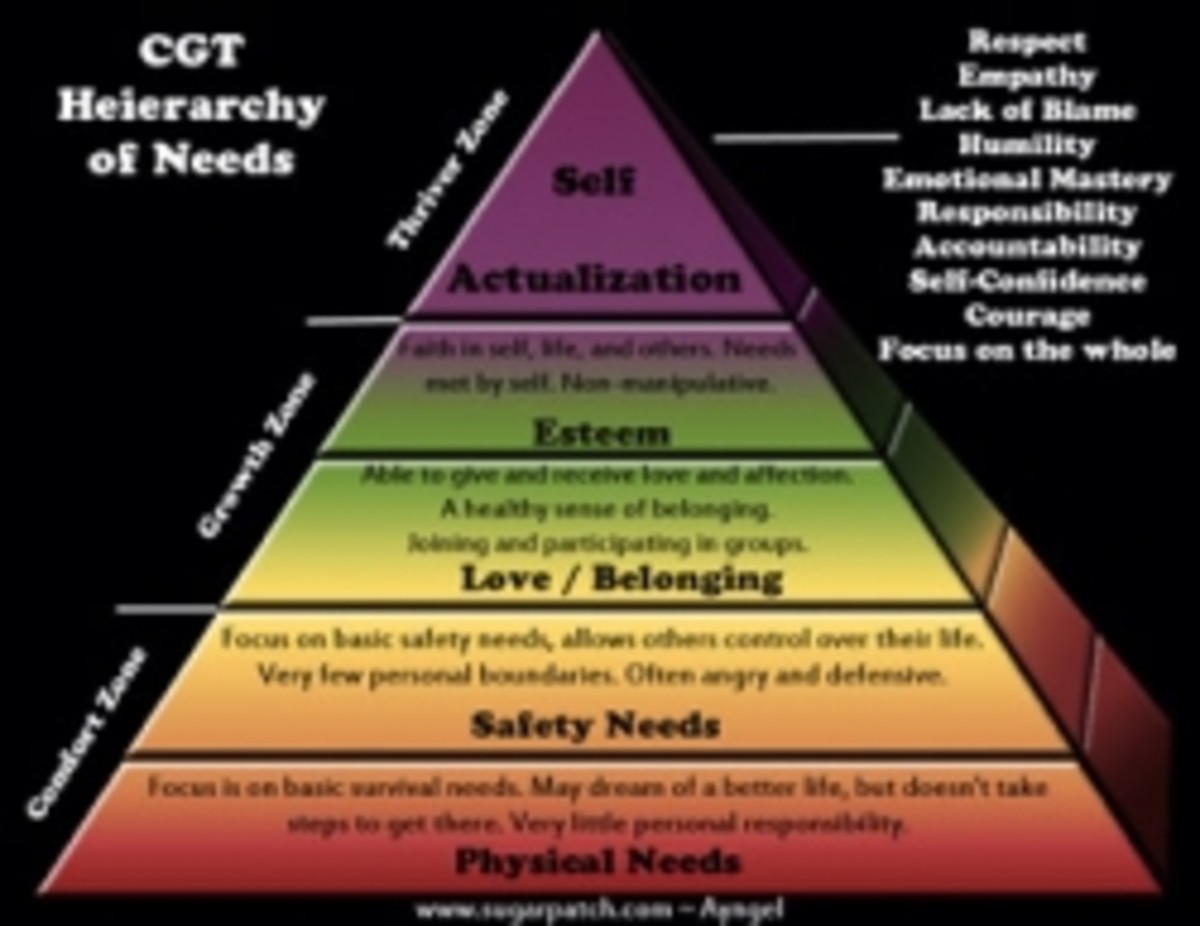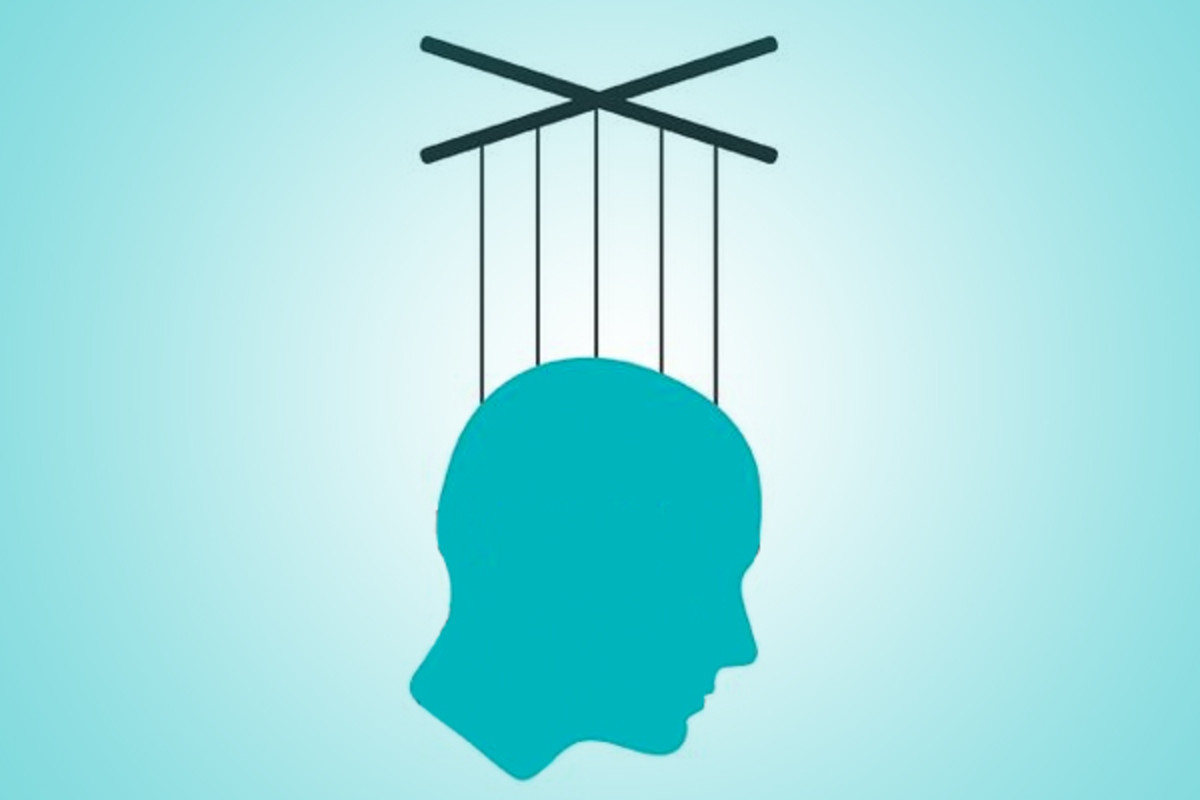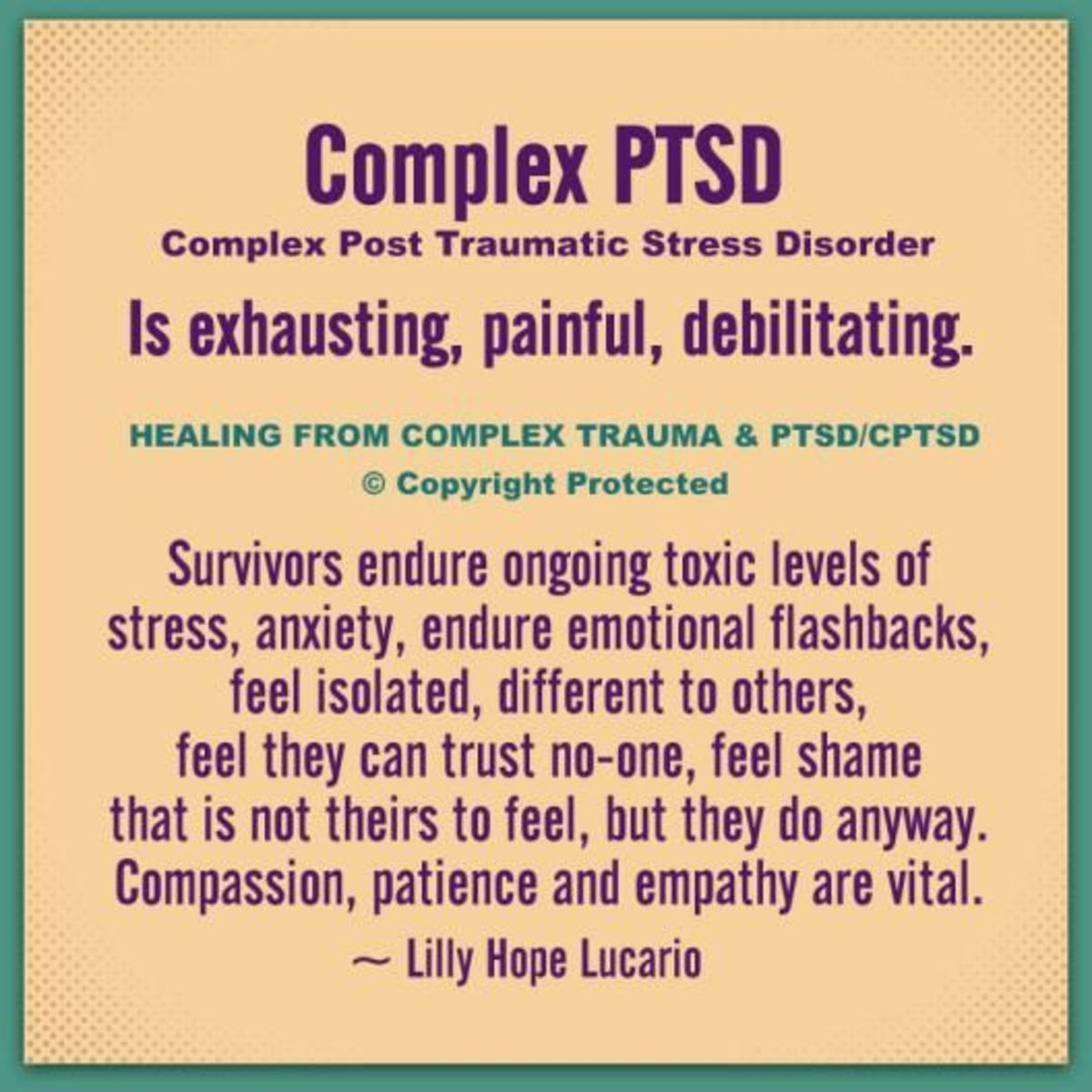Self-Actualization and Maslow
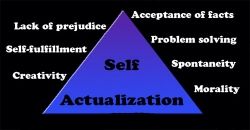
What is Self-Actualization?
If you aren't familiar with Abraham Maslow and his Hierarchy of Human needs, or would like a refresher course please feel free to visit my more thorough lenses on the subject, links can be found below.
Psychology itself is simply a study of the mind, a field that finds its roots in philosophy.
There are a great many schools of thought when it comes to psychology. four basic schools of thought when it comes to psychology, many of them are offshoots of the four most influential schools.
Psychoanalysis, behaviorism, cognitivism, and humanism and existentialism. All four schools of thought attempt to answer the basic question of why do humans do the things they do?
Some believe that the subconscious is what motivates a human to action, others believe it is positive and negative stimuli. Abraham Maslow is considered the father of humanistic psychology, which is defined as the "personal nature of the human experience."
Maslow believes that humans were motivated by needs, these needs fell into a hierarchy, with the basic survival needs at the bottom and self-actualization at the top.
Self-actualization is seen as a sort of enlightenment stage, where the person is thought to transcend basic needs and move on to higher pursuits such as beauty, truth, creativity and spirituality.
So what is self-actualization really, and what does it mean to you?
Abraham Maslow is not the first or only psychologist to use the term self-actualization.
Kurt Goldstein, envisioned self-actualization as a motive, a driving force that ultimately determines the path a persons life takes.
Carl Rogers on the other hand saw it as a humans ability to confront problems and struggle to master them in the name of personal growth.
Maslow had a slightly different view, where many branches of psychology find their roots in studying aberrant or unhealthy behaviors, Maslow began his studies by working with those he considered to be healthy and motivated.
Instead of looking for what went wrong, he went in search for what went right.
In his search he discovered a small group of people, perhaps as little as 2% of the entire population that have reached the full realization of their human potential. He believed that those who are reaching for self-actualization have realized a higher level of humanness in a way.
In most cases self-actualization cannot be reached unless the lower order needs have first been met. That is to say you should have adequate physical, safety, love, and esteem needs before you can move on to self-actualization.
We have all known someone who seemed to be in touch with something higher, not just within themselves but with the world around them.
Actualization alone is defined as "making real or giving the appearance of reality," to make real your own potential.
We all come from different cultures, different backgrounds, different schools of discipline. What is important to one may or may not be important to another. Yet, no matter where we come from, how we were brought up, or what obstacles we face along the way, the one thing that remains consistent through all humanity is potential.
Potential, we all, each one of us, has the capacity to be whatever it is we were meant to be. The difference is not in the amount of potential any of us have been granted, but in how we choose to use it.
If we use that potential to take from others that which we have not earned, to harm those who are smaller or weaker than ourselves, to take instead of give then we are missing the true nature of ourselves and our potential.
An actualized person can rest assured that they know exactly what they are supposed to do, supposed to BE in this lifetime. They wake up in the morning knowing exactly why they are here.
When you are free to look for higher beauty and truth in the world around you, to seek out new knowledge, to continue to learn and grow without fear.
Understands reality, and accepts responsibility for it. Does not feel threatened by the unknown.
They possess an above average ability to use reason, and to see truth.
They are aware of their strengths and their limitations, and the strengths and limitations of others and accept them.
They are capable of great objectivity, aware of and sensitive to others.
Greater capability to focus on the solution instead of the problem.
Often focused on problems outside of themselves, willing to work toward solving greater problems.
They understand the difference between good and evil, and can distinguish between means and ends.
Do not twist their views in ways that hurt themselves or others.
They are honest, and possess a democratic character.
They tend towards the equality of all human beings, and that every individual has a right to be heard.
Perceive and understand human nature. They accept themselves, others, and circumstances for what they are.
Able to be friendly with anyone and learn from anyone.
A fresh appreciation of people, and appreciate the best aspects in all things.
Do not hold on to stereotypes, or conformity to culture.
Intimate relationships tend to be profound, and sincere rather than superficial.
Interested in deeper and more meaningful relationships.
Can be alone without being lonely, they desire solitude and privacy at times.
Uses quiet time for quiet reflection and private thought, not uncomfortable with silence.
Believe in self, who and what they are, are capable of making decisions and doing things on their own.
Emotionally intelligent, do not need manipulation, guilt, or shame to get what they want.
Greater range of emotional responses to situations.
Thoughts and actions are determined by their own internal moral standards, uninhibited by convention or conformity.
Seek unity and wholeness. Able to merge opposing views into a third possibility, reducing conflict.
They possess an inborn uniqueness that carries into all they do.
Highly creative, art, writing, music, or other creative pursuits are common.
They are highly spontaneous, and have no unnecessary inhibitions.
A natural simplicity, not interested in being who others think they should be.
Child-like approach to life. Finds joy in what is simple and natural, seeks out beauty and serenity.
Still able to enjoy the things of childhood yet retain wisdom of adulthood.
Capable of living moment to moment, life life to the fullest.
Peak experiences come frequently, when they can clearly see what was hidden or clouded before.
Healthy sense of humor, capable of laughing at themselves, no need to use humor that harm others.
Typically seen as good natured, but capable of great seriousness.
Motivated to continual growth throughout their lifetime.
Understand there are always new things to learn and new ways to grow.
Though comfortable with themselves, they never stop growing.

Who is Abraham Maslow?
Abraham Maslow is recognized as the father of humanistic psychology. Instead of studying unhealthy people, he studied healthy individuals, and tried to define positive mental health.
Maslow's Basic Principles:
1. The normal personality is characterized by unity, integration, consistency, and coherence. Organization is the natural state, and disorganization is pathological.
2. The organism can be analyzed by differentiating its parts, but no part can be studied in isolation. The whole functions according to laws that cannot be found in the parts.
3. The organism has one sovereign drive, that of self-actualization. People strive continuously to realize their inherent potential by whatever avenues are open to them.
4. The influence of the external environment on normal development is minimal. The organism's potential, if allowed to unfold by an appropriate environment, will produce a healthy, integrated personality.
5. The comprehensive study of one person is more useful than the extensive investigation, in many people, of an isolated psychological function.
6. The salvation of the human being is not to be found in either behaviorism or in psychoanalysis, (which deals with only the darker, meaner half of the individual). We must deal with the questions of value, individuality, consciousness, purpose, ethics and the higher reaches of human nature.
7. Man is basically good not evil.
8. Psychopathology generally results from the denial, frustration or twisting of our essential nature.
9. Therapy of any sort, is a means of restoring a person to the path of self-actualization and development along the lines dictated by their inner nature.
10. When the four basic needs have been satisfied, the growth need or self-actualization need arises: A new discontent and restlessness will develop unless the individual is doing what he individually is fitted for. A musician must make music, an artist must paint, a poet must write--in short, what people can be they must be.
I appreciate your time in reading this and any other lens I have created, if you are so moved, please leave a comment below.


